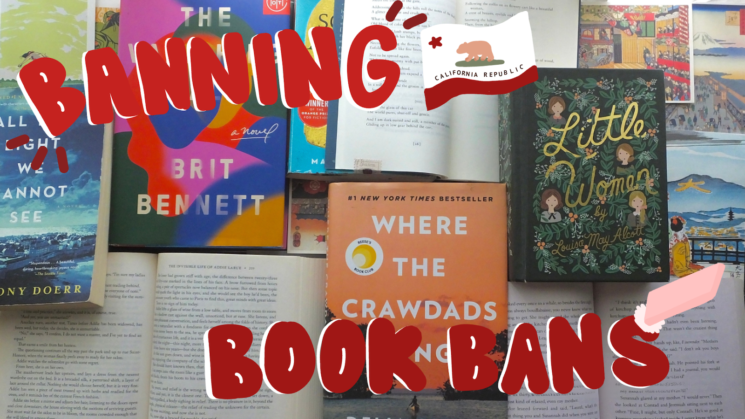
By Arielle Nguyen
Governor Gavin Newsom signed Assembly Bill (AB) 1078 to prohibit California schools from banning books that teach racial diversity, sexuality and gender identity on Sept. 25, 2023.
The argument surrounding book bans remains a political and moral dilemma. The law took effect immediately after signing as Governor Newsom referred to this bill as “long overdue,” according to an X, formally known as Twitter, announcement.
“Remarkable that we’re living in a country right now [with] this banning binge,” Governor Newsom said in the X announcement. “This cultural purge that we’re experiencing all throughout America, and now increasingly here in the state of California. We want to do more than push back rhetorically on [book banning].”
Governor Newsom and his administration believe that restricting access to books that inform students of our nation’s history, voices and people only reduces the learning experiences that the students receive.
“We eliminate the mirror in which young people see themselves reflected,” First Partner Jennifer Siebel Newsom said according to the Office of Gavin Newsom. “We Californians believe all children must have the freedom to learn about the world around them and this new law is a critical step in protecting this right.”
Senate Bill 48, approved in 2011, required schools to integrate contributions from people of color and the LGBTQ+ into their social science curriculums. This bill was strengthened after a Southern California school district rejected its social science curriculum this summer after its lectures contained information about an LBGTQ+ historical figure.
Newsom fined the school board $1.5 million, forcing that school board to modify its curriculum to be inclusive.
“Inclusive education promotes the academic achievement and social development of our students,” State Superintendent Tony Thurmond said. “AB 1078 lays out the structure for today’s action, and I am proud to have sponsored this bill to protect our students from the harmful effects of book banning, exclusion of inclusive textbooks and discrimination.”
Huntington Beach Union High School District’s (HBUHSD) librarian Elizabeth Taireh believes that certain parameters should be implemented for books that aren’t appropriate for young adults or children.
“It’s a little difficult for school libraries [that want to ban books] because we ban books like 50 Shades of Grey; it’s not appropriate for our student base,” Taireh said.
Taireh, who has been HBUHSD’s librarian for six years, is heavily involved in the process of choosing books. To ensure a safe environment for students, Taireh explains that approving books for school libraries requires the voices of the respective school principal, school boards and administration, as well as the librarians themselves.
“We adhere to a very strict policy … students can request books from us, and we’ll evaluate if it’s a good choice,” Taireh said. “If I don’t have a good reason for [a book] to be here, then maybe it shouldn’t be here.”
The new law increased the rigorous effort to preserve a child’s innocence. Parents, along with school board members, may disagree with what is shelved in their student’s libraries. Regardless, the final decision comes down to the respective school boards.
Taireh believes parents can converse with their children to discuss literary boundaries.
“In a library, you’re not forced to read anything,” Taireh said. “So, parents will often get upset that there’s a book in the library because it’s not aligned with their values. And that’s great, but [parents] should try to talk to their child about not checking it out.”
Taireh adds that school districts are granted the right to allocate their taxpayer and district-funded money to any books they wish. Although California schools cannot ban books from their own libraries, they are still able to go through the process of determining appropriate books.
However, Taireh explains that the only drawback of AB 1078 is that once a book is on the shelf, it’s difficult to remove due to the new California law.
“Book banning is just an interesting topic,” Taireh said. “I think it should be an ever-evolving conversation. And I think sometimes people get upset, but you should always ask about books.”





